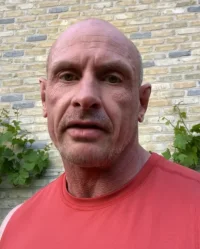so you mean free testosterone is key? what ft to shoot for? or is there a certain way to find this out?
is this really that high? When I read somewhere else then it seems like 20mg of prop doesnt seem so high.... ok there are the 150 IU hcg added.
Forget getting caught up on 20 mg TP is not that high as It comes down to the dose and what peak--->trough levels are achieved!
Lots of men can easily hit a healthy/high trough FT injecting much less.
Same can be said for TC/TE!
You are injecting TP daily which means that your peak is going to be 40-50% higher due to the PK.
Your hitting a high trough FT which means your peak FT will be absurdly high.
Big difference between one hitting a high trough FT injecting TC/TE daily!
TP is a different animal and the last thing you want to do is aim for too high a trough!
Overkill here!
Yes FT is the active unbound fraction responsible for the positive effects.
All that should really matter here is the dose one needs to achieve a healthy trough FT which will result in relief/improvement of low-T symptoms and overall well-being.
Yes symptom relief is what truly matters but when it comes to what FT level is needed one needs to keep in mind the overall goal would be to use the least amount in order to feel well while at the same time minimizing sides and keep blood markers healthy long-term.
You need to pay attention to your trough FT on said protocol (dose of T/injection frequency).
Always need to be mindful of your injection frequency/where trough FT sits.
FT <5 ng/dL would be considerd low.
FT 5-9 ng/dL would be considered the grey zone where some men may experience symptoms of low-T.
FT 10-15 ng/dL would be healthy.
FT 20-25 ng/dL would be high-end/high!
The majority of men will do well with a trough FT 15-25 ng/dL depending on the injection frequency.
Yes many tend to aim for the higher-end but you need to keep in mind that there is a big difference between one running a high-end/high trough FT 20-25 ng/dL injecting daily vs twice-weekly vs once weekly.
Also going to be a big difference in peak--->trough on said protocol!
Many tend to overlook this and gun for a high-end/high trough FT regardless of their injection frequency only to end up struggling with sides especially in the long run.
The human body was never meant to be amped up on T let alone 24/7!
Running too high a trough/steady-state FT will hammer the s**t out of your dopamine and CNS to boot!
Just to put this in perspective most healthy young males would be hitting a cFTV 13-15 ng/dL or 10-12 ng/dL tested using the most accurate assay the gold standard Equilibrium Dialysis and this is a short-lived daily peak to boot!
Even if you take those natty outliers in the 95th percentile hitting a high FT 25 ng/dL again this is a short-lived daily peak to boot!
You have guys on T hitting a trough FT 25-30+ ng/dL injecting daily with FT elevated 24/7, or EOD as in every 2 days (48 hrs post-injection), or twice-weekly as in every 3.5 days (84 hrs post-injection), or once weekly as in 7 days post-injection.
You get the point!
Again when speaking about those natty outliers in the 95th percentile hitting a high FT 25 ng/dL this would be a short-lived daily peak.
You can see how absurd this is when you have guys running a high/absurdly high trough FT 24 hrs, 48 hrs, 84 hrs or 168 hrs post-f**king injection!
Everyone caught up into thinking they need to be hitting high absurdly high troughs in order to experience relief/improvement in low-T symptoms let alone feel great overall!
You know that more T is better mentality!
It's a myth pushed by all those halfwits stinking up those so called men health/HRT forums.
Pure nonsense.
All that should really matter here is the dose one needs to achieve a healthy trough FT which will result in relief/improvement of low-T symptoms and overall well-being.
For the majority if we are talking trough here it would be a healthy trough FT 15-25 depending on the injection frequency.
Yes symptom relief is what truly matters but when it comes to what FT level is needed one needs to keep in mind the overall goal would be to use the least amount in order to feel well while at the same time minimizing sides and keep blood markers healthy long-term.
This needing to hit a trough FT 40-60 ng/dL pushed by those sheep or so called gurus is pure bulls**t.
I could name numerous top doctors in the field that have treated thousands of men over decades who would s**t all over this!
LMFAO!
Abe already toasted the myth that one needs to have high steady-state (24/7) or better yet a high trough FT!
The newer oral TU formulations (Jatenzo, Tlando and
Kyzatrex) put the f**king nail in the coffin here!
Dr. Morgentaler
Pros/Cons oral TU (51:24-57:12)
* one of the things that the orals have transformed is the concept that you have to have a continually high level of testosterone to get the benefits and clearly that's not true and the safety profile seems to be improved by having levels that fluctuate some during the day returning to close to or even baseline
Nuff said!
Dr. Morgentaler
* what's important to understand though is that the concept of testosterone therapy in theory is designed to replicate youthful levels of testosterone to help people who are deficient in this hormone, the goal isn't to make them into supermen and the real question is why do people want to go above normal if at all, much of the concept of treating up lets say a 1000 let's say our normal upper limit, in the anti-aging community or age management community there are some people who believe the there's an optimal level of testosterone that may be 1200 or 1500 or even I've heard 1800 and the basis for that is WEAK!
post #2/3
Throw this in there too for that dime a dozen club stinking up all those so called men's HRT/health forums!
Truth hurts!
This is coming from the man who would be considered the father of testosterone who has made huge contributions in the field of testosterone therapy and men's health let alone has treated 1000s of men over decades!
Would be considered one of the top heavyweights when it comes to (research/clinical experience) in the field of hormone replacement therapy!
* what's important to understand though is that the concept of testosterone therapy in theory is designed to...
*m Mean sexual activity scores rose from 2.43 points at baseline to 4.28 points at day 105 for men receiving oral testosterone undecanoate, a 1.85-point improvement during the trial.
“Just to put this in perspective, when we look at the TRAVERSE trial, that change [in sexual activity score] was about 1 [point],” Khera said. “This is significantly higher.”
Oral testosterone undecanoate significantly improved serum testosterone levels and sexual activity among men with hypogonadism, according to a subanalysis of a phase 3 trial presented at the Androgen Society annual meeting. The inTUne phase 3 trial was conducted to assess the safety and efficacy...

www.healio.com
Oral testosterone undecanoate significantly improved serum testosterone levels...
Show notes:
(
0:00) Intro
(
1:01) The 13-year FDA journey and breaking stigmas
(4:09) Why it’s different from other oral testosterone
(6:12) Mimicking the body’s natural testosterone rhythm
(9:10) Estrogen balance, side effects, and fertility concerns
(
13:51) Testosterone’s role in women’s health
(
16:56) Free vs total testosterone and SHBG reduction
(
24:08) Testosterone vs weight loss drugs
(
29:55) Who should be cautious with testosterone therapy
(
35:46) What counts as low...
Notice where the median mFT (ng/dL) vs 95% mFT reference range (ng/dL) sit!
LMFAO!
*Serum samples were analyzed from healthy men participating in the SIBLOS/SIBEX and EMAS studies, both population-based cohort studies
* mFT levels were measured in 867 men using ED LC-MS/MS as previously reported (1). Subsequently, 95% reference ranges were determined using the non-parametric method
Just to be clear up any confusion this is Fiers camps data for mFT reference ranges not the harmonized reference range being worked on by the CDC.
*Serum samples were analyzed from healthy men participating in the SIBLOS/SIBEX and EMAS studies, both population-based cohort studies
* mFT levels were measured in 867 men using ED LC-MS/MS as previously reported (1). Subsequently, 95% reference ranges were determined using the non-parametric method
Reference: 1. Fiers T, Wu F, Moghetti P, Vanderschueren D, Lapauw B, Kaufman JM. Reassessing Free-Testosterone...














